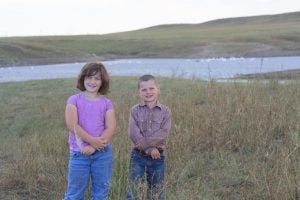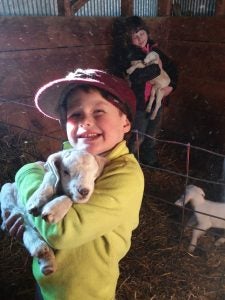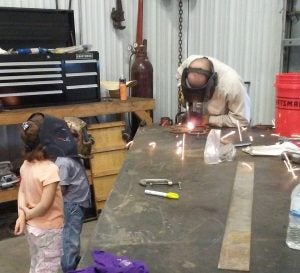A Wyoming ranching family shares what it has done to bring agriculture into the kids’ homeschooling routines
The pandemic made homeschooling become a hot topic among families with school-age children, with many parents opting to try homeschooling to protect their kids from potential COVID-19 exposure at school. For many parents, the thought of homeschooling is daunting, at best. However, one Wyoming mom says that it’s not as scary as it seems.
Crystal Olson, who now lives in Lusk, Wyoming, homeschools her two kids while living on her family’s ranch, which is an Angus cow/calf operation that also sells bred heifers. Her husband works full-time for a natural gas company, and Olson does part-time writing and photography, but the family helps out on the ranch when needed and as their schedules allow. Although the family does not have any cattle of their own, they do have goats and horses. Olson has a degree in agriculture and has been involved in agriculture her entire life. Both Olson and her husband have worked for various ranches during their marriage, and strive to have their own operation.

Olson’s kids are Helen, 9, is in fourth grade, and Gus, 7, in second grade. I talked to Olson about homeschooling and how their family integrates agriculture into their kids’ education.
Q: How long have you been homeschooling?
A: We first heard about Common Core when our kids were babies, and my husband and I agreed we didn’t want that. Helen went to kindergarten in public school when we lived in South Dakota. When our daughter was in kindergarten, the amount of homework was ridiculous. That was not the lifestyle we wanted. We decided to homeschool after that year, so this is our fourth year homeschooling.
Q: How do you get started homeschooling?
A: I don’t knock public school. They do the best they can with the red tape they have to deal with. Each state has guidelines and required classes for homeschooling. Wyoming requires math, science, reading, language arts, civics, and history, but the state is pretty lax compared to other states. Each year, we submit a letter of intent to homeschool to the school district superintendent, which must be approved.
Q: How do you choose a curriculum?
A: We’re free to choose whatever curriculum we want. In addition to the required classes, I also include music, art, and Bible studies. We use a lot of animal science with our science curriculum, and we use 4-H curriculum. There are some curriculums you can buy that are all in one. That’s a great way to start to gain confidence, and from there, you can supplement with anything — your imagination is the only limit. You can use a different curriculum for each subject, but that does take more time and research. If a curriculum isn’t working for you, then change it. Teaching kids about a topic doesn’t have to be a big production — it can be small things, too. For example, my kids finished up their Earth science class by going on a field trip with my mom to look for fossils and rocks. My husband is a big hunter, trapper and outdoor person, so we’ve included that into homeschooling, too, like survival studies, compass reading, map reading, etc. My kids have learned how to trap, firearm safety, shooting, animal tracking, etc. We teach them about grazing, grasses, and soil health. Both kids have spent time with me in the kitchen. and I trust them completely to read recipes, cook and bake when I’m not in the room. They can both run a sewing machine and sew by hand. By exposing our kids to these things at young ages, they’re capable of so much more than we give them credit for. To us, that is a real, well-rounded education.

Q: How do you include ag in your homeschooling?
A: Ranching is not a weekend hobby. We love the flexibility that homeschooling offers. If we’re pregnancy checking cows, we don’t have to pull the kids from school — they just help out.
Q: How do kids still learn social skills and other interpersonal skills?
A: A lot of farm/ranch families could see how beneficial it is when their kids are doing life with them — it’s an extension of what they do anyway in the ag lifestyle. Homeschooling is no different. You’re incorporating your kids into all you’re doing anyway. Many ag people regularly participate continuing education, so you’re teaching your kids that learning is a lifelong thing, how to love learning, how to learn and how to find resources to learn. Families use social skills and working with others naturally in everyday life, such as going to the grocery store and interacting with other people. You don’t have to be sitting in the classroom with your peers. That’s not real life. In the workforce, you’ll be working with people of all ages and walks of life. We do meet regularly with a group of homeschool kids, and our kids get a lot of interaction through 4-H, too.
Q: What’s your advice for homeschooling parents?
A: Don’t feel like you’re inadequate. If you’ve graduated from high school, you have everything you need. If you don’t have a skill set, you can get that skill set. You can pull in other resources from your community, access the Internet, get any book possible from the library on any subject. Homeschooling is a total mind shift of what education has always looked like to what it can be because — our world is so different now. We don’t think about resources in a formal education sense, but tools like YouTube videos are excellent resources. The best advice I got was to just start somewhere. It’s hard work and takes dedication. There are a lot of hard days and tears, but that’s part of parenting. From the time our kids were babies, we’ve been teaching them about the world around them, and homeschooling is building on that.

Q: What other resources are available for parents interested in homeschooling?
A: There are way more resources out there than you realize. It can be overwhelming. You can learn what your teaching style is and what your kids’ learning styles are.
Q: What’s the best part about homeschooling for you?
A: When you get to see those aha moments, there’s nothing better. The hardest jobs come with the biggest rewards, just like in agriculture. We also can set our own schedule and still get school done. School doesn’t have to start at 8 a.m. It can be whatever works for your family. Maybe it starts after Mom is done with her work. When Dad comes in for lunch, he helps out.
Sarah Hill is an agricultural writer and communications professional from Hetland, South Dakota. She grew up on a dairy in Missouri and is a 2008 graduate of the University of Missouri with a degree in Agricultural Journalism.



